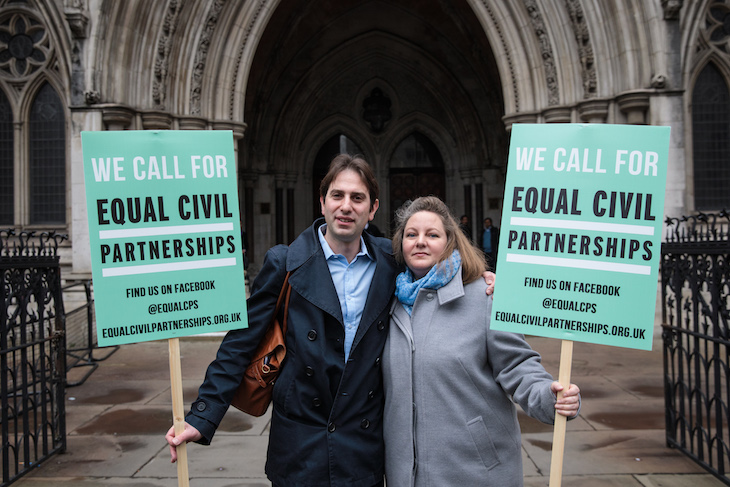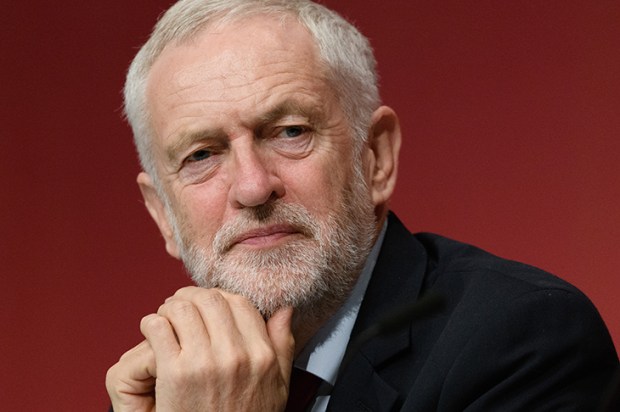Rebecca Steinfeld (37) and Charles Keidan (41) have a moral objection to marriage. They’ve been together since 2010, have two very small children, but haven’t tied the knot. This, they say, is because the law doesn’t offer a knot they’re comfortable tying. ‘Charlie and I see each other as partners already in life, and we want to have the status of being partners in law,’ says Rebecca. They hold (and you may agree or disagree but it’s not a crazy view) that the concept described by the word ‘marriage’ is asymmetrical between the man and the woman, and inextricably tangled with religion and with cultural attitudes this couple (and others) may not share.
So in 2014 they tried to register a civil partnership at Chelsea Town Hall, but were told such partnerships were for same-sex couples only. They went to law. Their challenge was that section 1(1) of the 2004 Civil Partnership Act — ‘a relationship between two people of the same sex’ — contravened their reading of the European Convention on Human Rights, so (they argued) they were being discriminated against. Last week the Supreme Court agreed.
I haven’t seen Charles Keidan in ages but we met and talked years ago and found ourselves often on the same wavelength; and I can tell you he’s a deeply, almost painfully, serious man, and no posturer. Plainly, though, this legal venture was undertaken not primarily for his and Rebecca’s personal convenience, but to make a point the couple believe is of wider significance. I think they’re almost right, but not quite. And in narrowly missing its target, the debate they’ve sparked has missed the target too.
It is not a matter of a right to ‘choose’ a civil partnership. It should be the only contract available. In practice, though not in name, it already is: no couple who seek a legal framework to their relationship have any choice but the almost identical provisions that supply the statutory core of rights and obligations for both the ‘marriage’ and the ‘civil partnership’ contract. It’s just that with heterosexual couples the contract has to be struck within settings associated with ‘marriage’ and called ‘marriage’. But the vital, secular, legal kernel — the contract — needs to be lifted clear of all the hoopla about God, bridal veils and paper confetti, and set down in another place, shorn of ceremonials. As for the word ‘marriage’, that expression should be left, as the ever pragmatic English, Scots, Welsh and Irish have always left vocabulary, to be shaped by evolving usage, unpatrolled by statute.
The error which we should address, and very easily could, is the tangling together, for largely historical reasons, of three quite separate purposes. The first is the issuing by the state of a licence. The second is the blessing by God of a union between two people. The third is the celebration, through ceremony and a party, of a couple’s passage into a social and cultural estate.
Because the state, the national religion and the national culture were once so closely entwined as to outlaw anything not sanctioned by all three, it never used to be necessary to make a distinction in time, place or law between the licensing, the blessing and the fleshly celebrations. And so ‘getting married’ came to mean all three. As a concept, the term ‘marriage’ was always a semantic and philosophical muddle, but it used not to matter much, because the priest, the notary, the congregation and the wedding guests were mostly (if I may return a clichéd metaphor to its roots) singing from the same hymn sheet.
Now they may often not be. Today, very significant sections of our population belong to different faiths and none; there are also widely different and deeply held attitudes towards the role of gender in life and in partnership. And a substantial number of our fellow citizens still don’t believe two people of the same sex can ‘really’ be married at all.
This last fact is the reason Parliament created the legal estate of ‘civil partnership’ in 2004, just as in 1837 we created ‘civil marriage’ in recognition of the fact that the established church was no longer the sole custodian of the civil institution of marriage — thus allowing other faiths and sects to hold and practise whatever beliefs they wished about what can make or dissolve what they called a ‘marriage’, while setting out a contract which the state recognises.
King Mswati III of Swaziland has 15 wives, and I’ve never heard the relationship described by any other word than ‘wife’ and ‘marriage’. According to the Roman Catholic church, most married couples who have made a legal divorce are still married, and I doubt Catholics would want to drop the use of that expression. The use of ‘marry’ is (depending on your viewpoint) either a conceptual mess or a tolerant recognition that different interpretations of the expression are possible. Whichever view you adopt, logic points to the conclusion that the word’s use as a legal term puts its ordinary usage under a strain that there is no need to prolong.
So the state, the law, and official documentation should drop the word. We register a baby’s birth in one place; we christen a baby (if we do) in another. Death certificates are issued in one place; funerals (if we want them) take place in another. We should marry (if we wish to) in any setting, according to any custom that we choose, pace its custodians’ rules. We could get the licence (if we wanted one) before or after the wedding. This would be the single, simple contract that the law offers couples desirous of entering a licensed permanent relationship, obtainable in a registry office, at a convenient time, witnessed or not by friends as we choose. We should call this a civil partnership, and the vast majority of couples who would describe themselves as married would have one. But not the King of Swaziland.
Got something to add? Join the discussion and comment below.
Get 10 issues for just $10
Subscribe to The Spectator Australia today for the next 10 magazine issues, plus full online access, for just $10.
You might disagree with half of it, but you’ll enjoy reading all of it. Try your first month for free, then just $2 a week for the remainder of your first year.















Comments
Don't miss out
Join the conversation with other Spectator Australia readers. Subscribe to leave a comment.
SUBSCRIBEAlready a subscriber? Log in